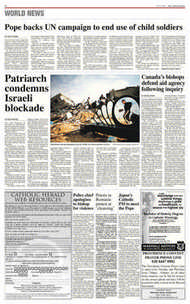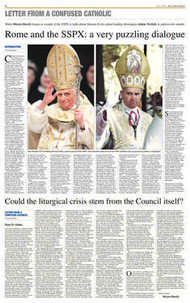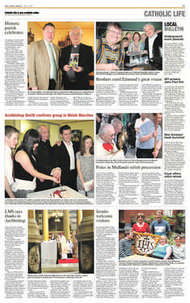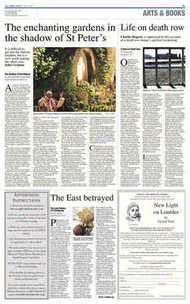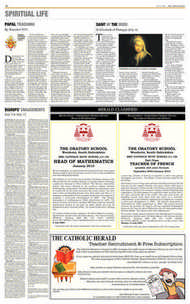Page 12, 3rd July 2009
Page 12

Report an error
Noticed an error on this page?If you've noticed an error in this article please click here to report it.
Tags
Share
Related articles
Judgment Seals Fate Of Adoption Agencies
The Church Must Take The Adoption Fight To The Courts
Tribunal Rejects Appeal By Catholic Adoption Agency
Church Forced To Withdraw From Adoption In Wales
Decision Time For Adoption Agencies
Cardinal's Adoption Agency Defies Government Over Gay...
Catholic adoption: why it might still have a future
The battle is lost in Britain, says Roy Peachey, but the Church can still promote adoption abroad
Having just returned from adopting our daughter in China, I find the Charity Tribunal’s recent negative ruling on the work of the Catholic Care adoption agency both dispiriting and baffling: dispiriting because children need families and baffling because of our experience of adopting from China.
At a time when a new way forward is required for our Catholic adoption agencies, I would argue that our family’s experience, and the experience of many like us, may suggest such an alternative. Adopting from abroad is no longer as unusual as it used to be. However, the practicalities of inter-country adoption and the wider implications which flow from those practicalities are still something of a closed book to most people.
In many ways inter-country adoption is no different from domestic adoption. Prospective adopters are required to undergo a long and rigorous assessment of their suitability to adopt by either the local authority or an adoption agency. Once this assessment has been completed and an adoption panel has been passed, the prospective adopters’ paperwork is sent to the relevant country.
What is not well known is that, in assessing prospective adopters, the British authorities are required to abide by very specific rules and regulations imposed by the country from which the child is to be adopted. In China’s case, for example, neither unmarried couples nor single people may adopt.
Since adoption from China is both highly regulated and well established in this country, these restrictions come as no great surprise to the British authorities. That they are accepted by those authorities reveals a clear case of double standards. The Chinese can insist that only heterosexual, married couples may adopt: Catholic adoption agencies in Britain cannot.
So does inter-country adoption provide an alternative way forward for Catholic adoption agencies? I would argue that it does, though not because it provides a possible way around the Sexual Orientation Regulations. There are other, more important, issues at stake.
Inter-country adoption is a good in its own right because there is no substitute for a loving family. In a world where, for all sorts of reasons, millions of children are left without the love and support of a family, inter-country adoption can help to bring at least some children and parents together.
As the Hague Convention on Protection of Children and Co-operation in Respect of Inter-country Adoption puts it: “The child, for the full and harmonious development of his or her personality, should grow up in a family environment, in an atmosphere of happiness, love and understanding.” In other words, what has become increasingly obvious in recent years is that institutional care is simply not in the best interests of any child. The ideal scenario, as the Hague Convention recognises, is for children to be raised by their birth parents but when that is not possible adoption can provide the happiness, love and understanding of which the Convention speaks.
The most obvious way for this to take place is through domestic adoption. Indeed, the many signatories to the Hague Convention recognise that it is preferable for children to be adopted within their own country but they also acknowledge that the hard reality is that there are hundreds of thousands of children worldwide for whom this is not possible. Inter-country adoption therefore meets an obvious and immediate need.
Nonetheless, the sad fact is that there is still a great deal of residual prejudice against inter-country adoption from some social workers and a certain lukewarm attitude from some parts of the British Government itself, even though it has signed the Hague Convention. The fact that the Department for Children, Schools and Families does not even collect statistics about the number of inter-country adoptions in Britain each year tells its own story.
The picture elsewhere is quite different. Countries such as France, Spain, the Netherlands and America adopt a much more positive attitude to inter-country adoption and they have the statistics to prove it. There is very interesting research currently underway at the University of St Andrews on attitudes in this country to inter-country adoption. When that is complete we will be able to see just how out on a limb Britain is.
Iwould argue, therefore, that Catholics in Britain now have the opportunity to follow the example set by other countries in embracing inter-country adoption not just as individuals but at a formal, institutional level too. The very notion of catholicity should encourage us to do whatever is necessary to allow needy children to be brought into loving families, wherever they come from.
Ever since St Paul used adoption as a central metaphor – if metaphor it was – in his epistles to the Galatians and to the Romans, Catholics have valued the oppor tunity to care for the orphaned and abandoned. Indeed, early Christian literature “was filled with positive and idealised images of adoption”, according to the historian John Boswell. The history of Catholic attitudes towards adoption is complex but the Catechism’s assertion that married couples “can give expression to their generosity by adopting abandoned children” is not unrepresentative.
There is certainly more work to be done in exploring adoption from a Catholic perspective but the groundwork has been laid. What generations of Catholic thinkers have shown is that the Catholic family is a more flexible and open unit than we sometimes allow it to be depicted.
So surely it is now time for our Catholic adoption agencies to follow their Anglican and Jewish colleagues into the field of inter-country adoption. Catholics around the world are already caring for the orphaned and abandoned so it would not be too great a step for British adoption agencies to help place some of those children in families where they would be loved and cared for.
The fate of our Catholic adoption agencies has, through no fault of their own, become highly politicised but, as my daughter’s frequent interventions have reminded me while writing this article, adoption is ultimately not a political issue but a personal and familial one. In the end every family and every child matters whichever country they come from, not because the Government tells us so, but because each one is precious in the sight of God. We must not let current political difficulties obscure that basic and glorious fact.
blog comments powered by Disqus







